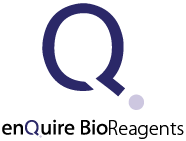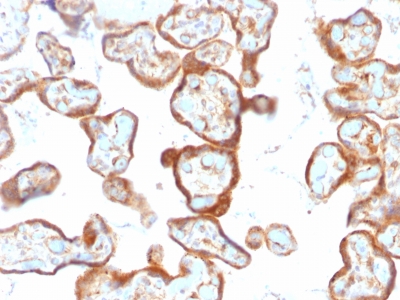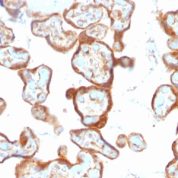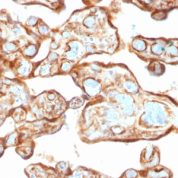Human, Mouse, and Rat Anti-Thymidine Phosphorylase / PD-ECGF Antibody Product Attributes
Species: Human, Mouse, and Rat
Tested Applications: Immunohistochemistry (IHC).
Clonality: Monoclonal
Anti-Thymidine Phosphorylase / PD-ECGF Antibody Clone: SPM322
Clone SPM322 Host and Isotype: Mouse IgG1
Anti-Human, Mouse, and Rat Thymidine Phosphorylase / PD-ECGF Positive Control Sample: HUVEC cells. Breast, Bladder, Lung or Kaposi tumors
Cellular Localization of Antibody Cytoplasmic and Nuclear
Buffer and Stabilizer: 10mM PBS with 0.05% BSA and 0.05% Azide
Antibody Concentration: 200 ug/ml
Antibody Purification Method:Protein A/G Purified
Immunogen: Recombinant full-length human Thymidine Phosphorylase (TP / PD-ECGF) protein
Storage Conditions: Store at 2 to 8° C (refrigerate). Stable for 24 months when properly stored.
Thymidine Phosphorylase / PD-ECGF Previously Observed Antibody Staining Patterns
Observed Subcellular, Organelle Specific Staining Data:
Anti-TYMP antibody staining is expected to be primarily localized to the golgi apparatus and nuclear bodies.Observed Antibody Staining Data By Tissue Type:
Variations in Thymidine Phosphorylase / PD-ECGF antibody staining intensity in immunohistochemistry on tissue sections are present across different anatomical locations. Low, but measureable presence of Thymidine Phosphorylase / PD-ECGF could be seen inendothelial cells in the cerebral cortex, glial cells in the cerebral cortex, cells in the endometrial stroma in endometrium, glandular cells in the endometrium, cells in the tubules in kidney, glandular cells in the prostate and seminal vesicle, keratinocytes in skin, melanocytes in skin, non-germinal center cells in the tonsil and urothelial cells in the urinary bladder. We were unable to detect Thymidine Phosphorylase / PD-ECGF in other tissues. Disease states, inflammation, and other physiological changes can have a substantial impact on antibody staining patterns. These measurements were all taken in tissues deemed normal or from patients without known disease.Observed Antibody Staining Data By Tissue Disease Status:
Tissues from cancer patients, for instance, have their own distinct pattern of Thymidine Phosphorylase / PD-ECGF expression as measured by anti-Thymidine Phosphorylase / PD-ECGF antibody immunohistochemical staining. The average level of expression by tumor is summarized in the table below. The variability row represents patient to patient variability in IHC staining.| Sample Type | breast cancer | carcinoid | cervical cancer | colorectal cancer | endometrial cancer | glioma | head and neck cancer | liver cancer | lung cancer | lymphoma | melanoma | ovarian cancer | pancreatic cancer | prostate cancer | renal cancer | skin cancer | stomach cancer | testicular cancer | thyroid cancer | urothelial cancer |
|---|---|---|---|---|---|---|---|---|---|---|---|---|---|---|---|---|---|---|---|---|
| Signal Intensity | + | - | ++ | + | - | + | ++ | + | - | + | + | + | - | - | - | - | - | + | + | + |
| TYMP Variability | +++ | + | ++ | +++ | ++ | ++ | ++ | ++ | ++ | ++ | +++ | ++ | ++ | ++ | ++ | ++ | ++ | ++ | ++ | ++ |
Limitations and Warranty
enQuire Bio's Thymidine Phosphorylase / PD-ECGF is available for Research Use Only. This antibody is guaranteed to work for a period of two years when properly stored.






There are no reviews yet.